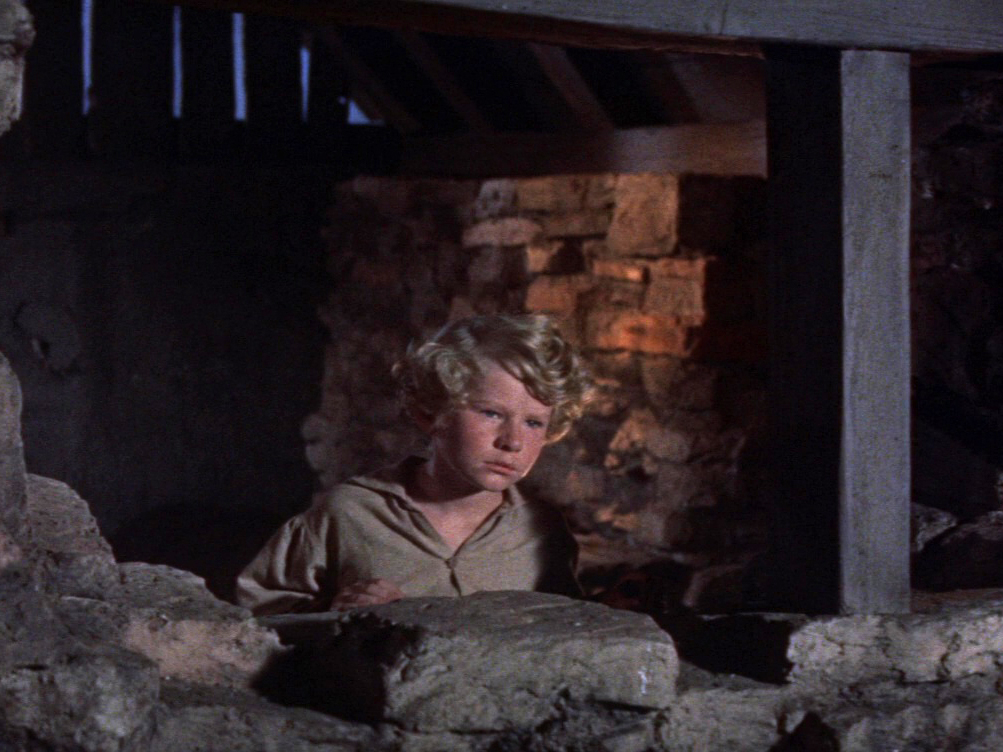
A young orphan is sent to the village of Moonfleet in Dorset, England to stay with his mother's former lover, who has the facade of a gentleman but leads a gang of swashbuckling bootleggers; the duo go on a treasure hunt.
EN
“The cinephile is an orphan who chooses to be kidnapped by a rather special passer-by who launches him, but not just any old way, on his apprenticeship in the world. There’s a film which tells this story, the cinephile myth incarnate; it’s Lang’s Moonfleet. Nobody learns as fast from Jeremy Fox as the young John Mohune. Obviously, if the auteur is like a father, you don’t make an alliance with him so as to go and have some fun with the other children. You make an alliance with him so he will show you the gravity of the world. In Lang, for example, children are the ones who should not be lied to.”
Serge Daney1
“I want to live honestly and refuse to contribute to any form of fascism”
Fritz Lang, 1946
Philippe Roger: The author’s ‘vision of the world’ would then be primarily a spatial, concrete point of view?
Serge Daney: This phrase ‘point of view’ has to be taken seriously. The point of view is a concrete situation in a cluttered landscape. It is subjective and, at the same time, it creates the objective. If I enter Lang’s point of view, I’m well aware that there are things which from that point of view cannot be seen at all, but I know that even because of this blind spot, there are things that I can only see with Lang. This is what now allows me to understand the amazing success of the phrase ‘mise en scene’ with the likes of us. The mise en scene is what shows up fracture points, oblique openings, suture or ‘padding’; you can slip inside a mise en scene, thanks to a change of shot, like a stowaway on board the film. You can learn about distances; the art of holding them, reducing them, sustaining them. In short, you can hole up, take in the whole picture, and that’s very useful in life. Later, my ‘case’ seemed pretty banal. The cinephile is an orphan who chooses to be kidnapped by a rather special passer-by who launches him, but not just any old way, on his apprenticeship in the world. There’s a film which tells this story, the cinephile myth incarnate; it’s Lang’s Moonfleet. Nobody learns as fast from Jeremy Fox than the young John Mohune. Obviously, if the auteur is like a father, you don’t make an alliance with him so as to go and have some fun with the other children. You make an alliance with him so he will show you the gravity of the world. In Lang, for example, children are the ones who should not be lied to.
From the film Propos d’un passeur : Serge Daney (Philippe Roger, 1993)2
“The sets are themselves a means of creating the horror which makes them reflect the mental world of the characters. Even the most glowing colours of Dorset, the splendid tonalities of the deserted places make one feel uneasy because of their density. The sea, with its waves, presents a concrete image of the inaccessibility of fate. But this frightening universe is not without the natural charm which is revealed in the novel as in all adventure stories. The critical mind takes away the romantic aura from the facts of the past, and reveals their base motivations, identical to those of our own times. On the other hand Lang always remains sensitive to the romantic elements which characterise his early films. Like all of Lang’s masterworks, Moonfleet owes its success to a very strong expression of the two components of his dialectics. The film achieves in this way a great subtlety of tone and rhythm.”
Luc Moullet3
- 1Serge Daney, Propos d’un passeur (1993).
- 2This quote was translated and transcribed from French by Kino Slang
- 3Luc Moullet, Fritz Lang (Paris: Editions Seghers, 1963).
The English translation was found in: Lotte Eisner, Fritz Lang (Cambridge, MA: Da Capo Press, New Edition, 1986)
FR
« L’enfant aura traversé les évenements, protégé par une indifférence profonde à tout ce qui n’est pas Fox ou la mémoire des Mohune. Cadavres squelettiques, pendus, combats, dangers, sadisme, orgie et violence sont écartés comme autant de rêves inopportuns pour lui. Il suit sa voie, s’appuyant sur Fox jusqu’à le désincarner de sa violence et de sa marginalité pour lui imposer ses devoirs envers lui. Lentement, il grignote sa place, investit l’aventurier et le détruit pour s’emparer du pouvoir. Mais ceci n’est qu’un pan de ce film d’une richesse infinie. Ce qui accroche l’œil et balaye la moindre analyse psychologique, c’est la marque du piège, inscrite par ces cercles qui se ferment, se brisent, ou prennent du volume en puits, en cavernes, en tunnels, comme il y en a toujours eu dans la panoplie langienne. Comme Moonfleet n’a jamais de moments spectaculaires dans l’utilisation sophistiquée d’un decorum ou d’un supercherie corollaire du genre, le lyrisme n’est porté que par cette étrange géométrie, cette mécanique, cette ‹ organisation qui travaille comme une machine ›. »
Noël Simsolo1
- 1Noël Simsolo, Fritz Lang (Paris: Edilig, 1985)

